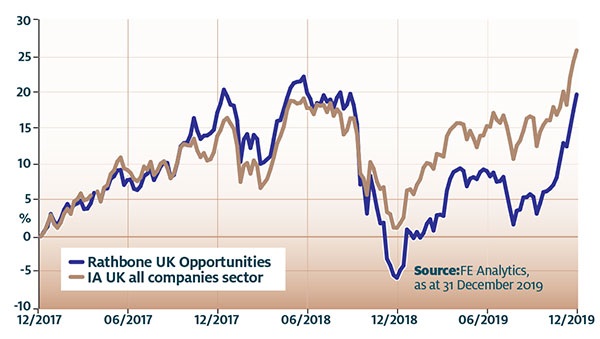Why investors should look beyond the FTSE 100 index
Investors should take a fresh look at the UK all companies sector, argues Cherry Reynard.
5th February 2020 10:02
by Cherry Reynard from interactive investor
Investors should take a fresh look at the UK all companies sector, argues Cherry Reynard, who looks at some great UK-focused funds.

In the immediate aftermath of the 2016 referendum, investors would have baulked at the idea of a hard Brexit; three long years later, gasping for any resolution to the tortured political process, they welcomed the certainty provided by an emphatic victory for Boris Johnson’s Conservative Party. The gloom finally started to lift for UK shares.
The turnaround actually started ahead of the general election in December, with the Investment Association UK all companies sector the second-best performing (after UK smaller companies) in the final quarter of 2019. Markets were already anticipating a Conservative victory and the end of the threat of a Jeremy Corbyn-led Labour government.
Global sentiment perks up
The change of heart towards unloved UK equities took place at the same time as a subtle shift in global market conditions. After a long period when markets favoured companies with reliable earnings and cash flow – ‘growth’ companies – September saw investors moving towards more ‘value’ areas and economically sensitive sectors such as financials and banks.
Adrian Lowcock, head of personal investing at Willis Owen, says: “2019 was a mixed year for investors in the UK, as Brexit concerns dominated the market throughout the year. As a result, the focus for investments remained squarely on growth companies for the bulk of the year, but there were periods when value investing took the lead: notably, towards the end of the summer when Boris Johnson became prime minister, and in the run-up and after the election when it became clearer that the Conservatives were likely to win a majority.”
The shift in sentiment was reflected in the relative performance of different parts of the market. The larger, global companies that make up the bulk of the FTSE 100 index lost the tailwind of a weaker currency – not because the currency strengthened (though it did see some improvement in the final quarter of the year), but simply because it stopped getting any weaker. Therefore, those international companies that had benefited from the translation effect of their dollar and euro earnings into sterling no longer did so. The index rose just 12.1% over the year.
Instead, the FTSE 250 index was the real winner, with the sector (ex investment companies) up 26.7%. Lowcock attributes this to the superior growth rates of mid-cap companies at a time when the market was still in hot pursuit of companies that could reliably grow earnings. That said, this continued even in the final quarter of the year when market sentiment changed.
For much of the year, small companies still had the overhang of Brexit. As UK economic statistics dulled, there was little appetite for companies that generated all their revenues from the domestic economy, as had been the case since the Brexit vote in 2016. The sector has also been home to some in-trouble retailers – Halfords (LSE:HFD), for example, down 34%, or Ted Baker (LSE:TED), down 74%. Nevertheless, the FTSE Small Cap sector (ex investment companies) managed to deliver a decent rise of 14.9%, with notable strength in the final quarter of the year as some resolution to the Brexit saga appeared to be on the horizon.
Mid-cap strength
The strength of the mid-caps was reflected in the UK all companies sector rankings. The Franklin UK Mid Cap fund had a stellar year, rising 42.3%, with Paul Spencer and Mark Hall continuing to demonstrate their stock-picking skill in spite of the fund’s large size (it is now worth £1.2 billion). ASI UK Mid-Cap Equity, AXA Framlington UK Mid Cap and Royal London UK Mid-Cap Growth also featured towards the top of the table.
MI Chelverton UK Equity Growth is worth a mention – it managed to secure second place over the year in spite of holding around 60% of the portfolio in small companies. Manager James Baker has largely avoided ‘domestic cyclicals’ in the wake of the Brexit vote, but had strategically rotated back into companies such as DFS Furniture (LSE:DFS) and Topps Tiles (LSE:TPT) in the middle of 2019.
Also notable was the strong performance of a number of ethical funds. In a year when real momentum has gathered behind the inclusion of environmental, social and governance (ESG) considerations, this shows how many of these funds have matured. Funds such as ASI UK Impact Employment Opportunities Equity, Premier Ethical, Liontrust UK Ethical and Investec UK Sustainable Equity were all among the top 20 performers over the year.
There was no notable outperformance from the big ‘problem’ sectors such as oil or mining (Royal Dutch Shell (LSE:RDSB) and BP (LSE:BP.), in particular, saw their share prices drop over the year). As such, ethical funds could compete on a level playing field. It is also possible that markets are increasingly reflecting ethical considerations in share prices. It stands to reason that as more investors start to follow an ethical mandate, share prices will increasingly reflect an ‘ethical premium’, whereby companies that score badly on ESG considerations are weak and those that score well can command higher valuations.
‘Deep value’ still dismal
There may have been some recovery in ‘value’ in the final quarter of the year, but it wasn’t enough to rescue some of the most high-profile ‘deep value’ and contrarian funds from a dismal year. Invesco High Income and Invesco Income UK were notable laggards, rising just 6.1% and 6.9%, respectively, in a year where the UK all companies sector as a whole rose 22.3%. Mark Barnett’s Invesco UK Strategic joined them near the bottom of the tables.
It is notable that these deep value funds have not bounced dramatically in the final quarter of the year. The Invesco funds have edged nearer to mid-sector, but it is those funds with a smaller-company bias that top the table in the short term. It is clear that if investors are going to back a ‘value’ horse, they will need to be selective. M&G Recovery, for example, barely participated in the value recovery, to the disappointment of those who have stuck with it in the hope of better times.
Darius McDermott, managing director of Chelsea Financial Services, believes there will be better times ahead both for smaller companies and, potentially, for value funds: “The UK market has remained unloved and under-owned, but UK companies have been very resilient in the face of Brexit and political uncertainty. If we get more clarity on Brexit, both small and mid caps could continue to do well in 2020, and we could also see some value funds do better.”
A further trend he highlights is that actively managed funds did extremely well in 2019 compared with trackers.
“Index funds are lagging at the bottom of the table – some are not performing as well as out-and-out value funds.”
It is perhaps worth noting also that some popular growth funds have struggled in recent months, which may continue.The long-term top performer LF Lindsell Train UK Equity, for example, had a tougher run. Lowcock says: “Towards the end of the year, growth funds saw increasing flows out and the market boosted domestically focused companies over internationals on the back of the election result. The likes of Lindsell Train UK Equity had a good year, but it ended up mid table as it has less exposure to domestic stocks.”
Certainly, it seems that there is now something different in the air for the UK all companies sector. Whether it is resurgence for small cap-focused funds, a tentative improvement in value or a rotation away from previously dominant growth stocks, it may be time to review your portfolio’s UK allocation.
UK All Companies sector shows mid-cap strength
| Fund* | 3m | 1yr | 3yr |
|---|---|---|---|
| Franklin UK Mid Cap | 13.81 | 42.30 | 55.69 |
| MI Chelverton UK Equity Growth | 15.34 | 40.58 | 70.76 |
| ASI UK Impact Employment Opps Equity | 15.81 | 40.55 | |
| ASI UK Mid-Cap Equity | 16.08 | 39.61 | 48.58 |
| Premier UK Growth | 18.07 | 39.42 | 46.38 |
| LF Miton UK Value Opps | 16.37 | 39.19 | 43.47 |
| Premier Ethical | 17.07 | 38.66 | 37.00 |
| Slater Growth | 13.49 | 37.87 | 53.18 |
| Liontrust UK Ethical | 12.64 | 37.83 | 56.51 |
| ASI UK Opportunities Equity | 16.04 | 37.10 | 49.53 |
Note: *Top 10 UK all company sector funds, ranked over one year. Source: FE Analytics, as at 31 December 2019.
Fund spotlight: Rathbone UK Opportunities
Rathbone UK Opportunities, a relatively minnow at just £44 million, has been under the care of Alexandra Jackson since 2017. Jackson specialises in small and mid-cap UK equities looking for companies where the potential for growth is under-appreciated by the market.
Structural growth companies form the core of the portfolio. These will have strong barriers to entry, recurring revenues and dominate their respective markets. The portfolio also holds some ‘defensive growth’ companies, and a smaller portion in companies with unique assets or higher beta. The fund has seen considerable momentum over the past few months as market leadership has shifted. One to watch.
One to watch as market leadership changes

Full performance can be found on the company or index summary page on the interactive investor website. Simply click on the company's or index name highlighted in the article.
This article was originally published in our sister magazine Money Observer, which ceased publication in August 2020.
These articles are provided for information purposes only. Occasionally, an opinion about whether to buy or sell a specific investment may be provided by third parties. The content is not intended to be a personal recommendation to buy or sell any financial instrument or product, or to adopt any investment strategy as it is not provided based on an assessment of your investing knowledge and experience, your financial situation or your investment objectives. The value of your investments, and the income derived from them, may go down as well as up. You may not get back all the money that you invest. The investments referred to in this article may not be suitable for all investors, and if in doubt, an investor should seek advice from a qualified investment adviser.
Full performance can be found on the company or index summary page on the interactive investor website. Simply click on the company's or index name highlighted in the article.
These articles are provided for information purposes only. Occasionally, an opinion about whether to buy or sell a specific investment may be provided by third parties. The content is not intended to be a personal recommendation to buy or sell any financial instrument or product, or to adopt any investment strategy as it is not provided based on an assessment of your investing knowledge and experience, your financial situation or your investment objectives. The value of your investments, and the income derived from them, may go down as well as up. You may not get back all the money that you invest. The investments referred to in this article may not be suitable for all investors, and if in doubt, an investor should seek advice from a qualified investment adviser.
Full performance can be found on the company or index summary page on the interactive investor website. Simply click on the company's or index name highlighted in the article.